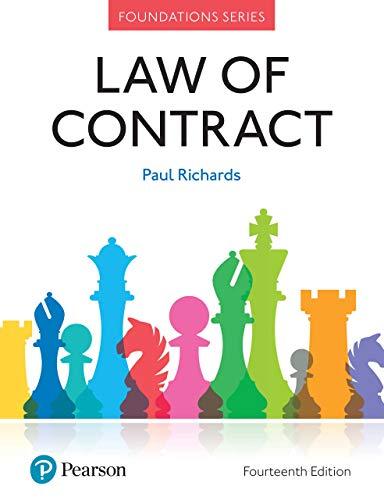Question
1) Which of the following is the 'A' element of a negligence claim Question 1 options: A duty of care exists between the plaintiff and
1) Which of the following is the 'A' element of a negligence claim
Question 1 options:
A duty of care exists between the plaintiff and the defendant
The defendant breached a duty of care that was owed to the plaintiff
There was a causal link between the breach of duty of care and the plaintiff's loss
The plaintiff suffered a loss for which damages are payable
2) Which of the following is the 'B' element of a negligence claim
Question 2 options:
A duty of care exists between the defendant and the plaintiff
The defendant breached their duty of care to the plaintiff
There was a causal link between the breach of the defendant's duty of care and the plaintiff's loss
The plaintiff suffered a loss for which damages are payable
3) Which of the following is the 'C' element of a negligence claim
Question 3 options:
A duty of care exists between the defendant and the plaintiff
Which of the following is the 'D' element of a negligence claim
Question 4 options:
A duty of care exists between the defendant and the plaintiff
The defendant breached their duty of care to the plaintiff
There is a causal link between the defendant's breach of duty and the plaintiff's loss
The plaintiff suffered a loss for which damages are payable
5) Which of the following isnota defence to a claim for negligence
Question 5 options:
Voluntary assumption of risk
Ignorance of the law
Contributory negligence
Illegality
6) Occupiers must take reasonable steps to protect all classes of visitors to their property
Question 6 options:
True/ False
7) Manufacturers are not liable for injuries caused by defective products
Question 7 options:
True/False
8) If a person experiences greater injury from our conduct than would be expected because of a unique physical condition, there is nonetheless a responsibility to compensate for all consequences of the injury. This principle is often referred to as the
Question 8 options:
Big skull rule
Egg head rule
Thin skull rule
Thick skull rule
9) In which of the following would the plaintiffnotsucceed in an action for negligence?
Question 9 options:
A surgeon used the skill of a reasonable doctor in that field, but the patient did not respond to the treatment and lost hearing in one ear. The patient sued the doctor
A real-estate agent accidentally forgot to lock the back door of the house he had just shown. Before the owner returned, someone broke in and stole the TV. The owner sued the agent
Julie was made sick by drinking a contaminated cola bought for her by her friend Fred. She sued the manufacturer
A lawyer failed to check the zoning and assured the purchasers that they could build a duplex on the property. Relying on that statement, they purchased the property
10) Which of the following statements describes the standard expected of experts?
Question 10 options:
Require skills and abilities expected of an average person
Must exercise skill with degree of care expected from a reasonable person in that profession
Inexperience excuses incompetence
The standard of an expert needs to be perfection
11) Although there was no carelessness on the part of Mr. Tam, and although he did not intend to harm anyone, he could still be sued by someone harmed by dangerous substances that escaped from his property. This is an example of what tort or what principle of tort law?
Question 11 options:
Vicarious liability
Contributory negligence
Strict liability
Defamation
12)
Mr. Dee was looking out his living room window and saw his next-door neighbour, Mr Bean, trying to burn leaves. Mr. Bean threw gasoline on the damp leaves, and when he lit a match, there was an explosion that sent flames in every direction. Luckily, no one was around, and the flame that shot onto Mr. Dee's property caused no harm whatsoever. Mr. Dee was upset by this carelessness and sued Mr. Bean for negligence. Which of the following is the best argument for the defendant, Mr. Bean?
Question 12 options:
He didn't owe the plaintiff a duty of care
There were no damages suffered
Mr. Dee had voluntarily assumed the risk
Mr. Dee was contributorily negligent
The defendant breached their duty of care to the plaintiff
There is a causal link between the defendant's breach of duty of care and the plaintiff's loss
The plaintiff suffered a loss for which damages are payable
4)
Step by Step Solution
There are 3 Steps involved in it
Step: 1

Get Instant Access to Expert-Tailored Solutions
See step-by-step solutions with expert insights and AI powered tools for academic success
Step: 2

Step: 3

Ace Your Homework with AI
Get the answers you need in no time with our AI-driven, step-by-step assistance
Get Started


